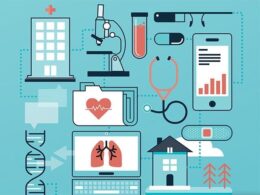This is a republication of the article below, with the title above, highlighting the topic in question.
Digital ecosystems: the future of healthcare
What it is, and how it can help patients and the healthcare system
Diagnostics Roche
Accessed on June 27, 2022
Site version edited by:
Joaquim Cardoso MSc.
The Health Revolution — Institutes
Digital Health Ecosystem — Institute
June 27, 2022
Structure of the publication
- Introduction
- What is a digital ecosystem?
- Using technology to enable personalised decision-making in healthcare
- The benefits of connecting diverse data across points of care
- The value for all: patients, healthcare organisations and innovator startups
Introduction
Life is rapidly moving from a paper- driven world to a digital one, where nearly every kind of information is stored on a computer, or in the cloud.
When applying for a bank account, visiting the doctor or using a smart fitness app to analyse progress, we are providing data at every point.
Data is everywhere and is being combined in new and diverse ways to shape how we see and experience the world.
Most recently, the COVID-19 pandemic ignited a new need for data and technology to be harnessed in the healthcare domain.
Across the globe, all kinds of new and emerging technologies are combining to bring about a digital healthcare transformation, a worldwide change, that fundamentally has never been seen before.
This radical acceleration highlights the potential to provide a more patient-centred delivery of care, using digital technology that can reshape and enhance our healthcare systems.
While it may be uncomfortable, some data gathering does offer huge potential.
When data is working for the benefit of patient health, to delay, sometimes even, prevent the onset of disease or to help us manage and maintain our wellbeing, then it’s for the best, right?
Still, data can’t do the job on its own.
To be effective, all of the available data needs to be sorted into relevant parts, organised into categories and recombined again to provide healthcare professionals with new perspectives and insights on clinical decision-making.
This is where digital algorithms come into play.
They combine and analyze a variety of data from existing lab and clinician workflows that can then be turned into actionable insights for physicians.
By comparing large amounts of data sets, oftentimes even across geographies and different cohorts, digital algorithms can help guide clinical workflows or support clinicians in their decision making or improve lab efficiencies.
Using cloud-based platforms and applications with encrypted technologies, can make health-related data more comprehensible, insightful and easily accessible only to the people who need it, where they need it, such as patients, and the healthcare professionals who serve them.
And this becomes possible when we can create secure, digital ecosystems across a variety of points of care delivery in a community linking patients with the care professionals working in clinics, labs, and hospitals.

What is a digital ecosystem?
A digital ecosystem connects diverse data resources, applications, devices and technologies, enabling them to work seamlessly together.
It offers society new ways to organise and deliver health care, and most importantly, new ways to improve patient outcomes and overall population health.
The aim ultimately is to securely deliver the right information, to the right person, at the right time improving cost efficiencies and clinical decision-making.

Using technology to enable personalised decision-making in healthcare
In the context of healthcare, a digital healthcare ecosystem is a combination of resources working together, using emerging applications and technologies, to unify different types of data (e.g., administrative, test results, etc.) gathered by clinics, laboratories or any medical test through lab or hospital information systems (LIS/HIS).
Actionable Insights (from the combination of data points) can be displayed on a computer dashboard or an app where a clinician can view contextualised medical insights on the individual.
These insights can also be integrated directly into the individual patient’s electronic medical record (EMR). (Administrative-related data can also be connected so that hospital or lab leaders can gain insights for improved efficiency and quality of healthcare service delivery.)
Imagine the amount of valuable health related insights created across the span of your own lifetime.
With such integration of vital patient information (or administrative information), sourced from every relevant data point, and presented in the EMR (or in another relevant dashboard), clinicians can efficiently and confidently make informed assessments and if necessary, make adjustments to treatment regimens and care plans.
The outcome is to provide a more personalised level of care for each patient.
In the context of healthcare, a digital healthcare ecosystem is a combination of resources working together, using emerging applications and technologies, to unify different types of data (e.g., administrative, test results, etc.) gathered by clinics, laboratories or any medical test through lab or hospital information systems (LIS/HIS).

The benefits of connecting diverse data across points of care
Beyond data from various healthcare locations, and laboratories, clinicians using clinical digital devices, and increasingly patients themselves, will also have greater opportunities to contribute to the rich quality and quantity of health data.
This will be provided through real-time test results using a growing variety of at-home tests and self-monitoring tools, devices and technology.
Innovative applications are being developed by innovative companies who understand the needs of patients and the potential for harnessing health data analytics.
Using wearable tech, smart delivery devices or sensors that record the results of tests into a mobile app or cloud based technology, patients can potentially be more engaged in managing their own testing.
Clinical digital devices are now entering the healthcare technology marketplace.
These devices are offering lab and hospital professionals new ideas and channels to improve efficiency of care delivery, lightening administrative burden upon healthcare services and, most importantly, bringing in new insights to clinical decision-making for patient care.

The value for all: patients, healthcare organisations and innovator startups
It’s easy to see the opportunities and value of combining more points of health data (patient and administrative) and bringing them securely into a connected digital healthcare ecosystem which uses emerging technologies to provide a reliable source of up-to-date information.
- Clinical insights for personalised patient care: Clinicians can view many data points together, through a single source, informing their decision making and personalised treatment plan for patients.
- Connectivity that integrates tasks, and lightens administrative burdens: Clinical and lab workflows and processes are standardised to deliver the required quality and efficiency for delivery of care.
- Easy, flexible ways for patients to participate in their own care: Patients are also empowered to contribute to, and be engaged in their own disease management and sometimes even disease prevention using applications and technologies that securely share information with their clinician.
- Secure channels for bringing continuous innovation to healthcare: Digital ecosystems in healthcare can also make it easier to connect medical professionals with innovator startups to explore and pilot how new applications and ideas can be applied to improve healthcare directly.
Over time, the digital healthcare ecosystem will build a repository of learnings and insights, which can help increase the effectiveness of personalised patient healthcare as well as disease management and prevention measures across the population.
Over time, the digital healthcare ecosystem will build a repository of learnings and insights, which can help increase the effectiveness of personalised patient healthcare as well as disease management and prevention measures across the population.
Originally published at https://diagnostics.roche.com.
Digital healthcare at Roche
Every day, we apply our deep knowledge in science and technologies to create digital solutions that help resolve challenges in healthcare. We are bringing patients, lab and hospital leaders, leading innovators and clinicians together to explore and test new ideas that improve diagnosis, clinical decision making and delivery of care for patients around the globe. With the use of digital healthcare ecosystems, we can, together and right now, innovate to change lives quickly and effectively for all. Please join us on this journey.
Corinne Dive-Reclus
Head of Lab Insights, Roche Information Solutions












